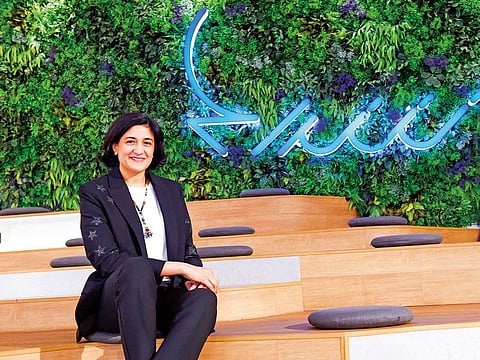Sharjah’s start-up platform scores hits
As many as 72% of Sheraa-mentored businesses are operational and that is quite a high

Dubai
A 72 per cent success rate? In the world of start-ups and putting funds into them, that’s quite an impressive number. The Sharjah Entrepreneurship Centre — or “Sheraa” as it is more popularly known — certainly thinks so.
“A Harvard Business School study has shown that only about 25 per cent of start-ups achieve long-term success,” said Najla Al Midfa, CEO of Sheraa. “So, we are quite excited by the fact that 72 per cent of our start-ups are still active — most of them are three years or younger.
“Our experiences have allowed us to develop a formula that ensures we focus on businesses that have the greatest potential to succeed. And on older founders who have the additional resources to carry their start-ups forward.”
Sheraa, which itself is only three years into its operations, supports start-ups through “equity-free grants” from a pool of $500,000 plus. The start-ups — numbering 72 — that it has been associated with have collectively raised $37.2 million from a wider pool of investors. Of these, 56 per cent of the funds came in after the start-ups tied up with Sheraa. These businesses have generated $24.4 million, 70 per cent of which came in after the Sheraa association.
For the moment, Al Midfa does not foresee the entity taking on a more direct — i.e., pick up equity — approach with the start-ups it associates with. But Sheraa is considering launching a “seed fund”.
“We do recognise that continued access to capital is vital for a start-up’s growth,” the CEO said. “As part of our ongoing efforts to support our founders, we are exploring the option of establishing a seed fund.
“Additionally, our long-term strategy may include initiatives to encourage further investment in our start-ups via investor education programmes.”
Sharjah, interestingly, has been witness to a start-up boom in the past three years. Sure, some have launched businesses in the ever popular tech and digital media space, but there have been quite a few who have ventured into more traditional spaces such as F&B operations, logistics, etc. The belief is that even in such “Old Economy” sectors, Sharjah and the wider Northern Emirates can still accommodate new businesses and new ways of operating them.
The UAE’s start-up and the venture capital scene has been having a good run, with the recent Uber-Careem $3.1 billion deal providing an all-too-obvious boost to sentiments. And, of course, there was the Amazon takeover of Souq in early 2017, with a price tag of $600 million plus. But beyond these high-exposure deals, the venture capital and funding rounds have had a busy time of it.
In Sheraa’s case, Al Midfa says it’s too early to talk about stock market floats and mega deals for its start-ups. “An IPO may be in the pipeline for some of our start-ups … we hope,” the CEO said.
The Sheraa way of investing
Unlike incubators and accelerators, Sheraa’s exposure to start-ups takes the form of grants rather than picking up equity in them. There are plans to upgrade its operations with the launch of a seed fund.
Businesses that it has invested in include Mr. Draper, an online shopping platform for men, El Grocer, a grocery portal, and MintBasil, which taps into a growing consumer appetite for healthier options.
“There is quite a bit of overlap between incubators and accelerators, which can sometimes lead to confusion,” said Najla Al Midfa. “Incubators tend to be longer programs that focus on earlier stage start-ups, providing founders with critical business support such as mentorship, coaching, access to market, and a physical space to work from.
“Accelerators, on the other hand, operate with set timelines — generally three months — and cohort-based — and are usually tailored toward start-ups that are beyond idea stage, with at least a prototype of their product ready.
“Both incubators and accelerators can be sector-specific, but accelerators are more likely to be. Additionally, while most incubators do not provide direct investment, the majority of accelerators do — this is typically $50,000-$100,000 in exchange for a small equity stake of less than 10 per cent.”



